![Top API security vendors [2025] Top API security vendors [2025]](/blog/images/top-api-security-vendors.webp)
Scaling a SaaS business is exciting: you’re shipping features faster, growing your user base, and integrating with the broader ecosystem. But with great growth comes great responsibility, especially when it comes to your APIs.
Each new endpoint you expose could be a potential entry point for attackers.
Choosing the right API security vendor is as important as getting bitten by the right spider to become Spider-Man.
Because if you pick wrong, you’re not walking away with superpowers. You’re more likely to end up with a compliance nightmare, a breach notification email draft, and an itchy metaphorical rash that just won’t go away.
And let’s be honest: the world of API security can feel like alphabet soup.
From DAST to runtime protection, AI engines to threat detection pipelines, it’s easy to get lost. That’s why we’ve created this guide, to help you navigate the noise and build a clear, future-proof security stack that aligns with your team’s workflows and your business’ goals.
Categories of API security solutions
API security isn’t a single-lane route. It’s a layered approach that spans multiple categories, each addressing a different aspect of your API risk surface. These categories help ensure coverage across the full API lifecycle, from design and development to deployment and runtime.
While many organizations adopt a mix of specialized tools for each category, it’s worth noting that some vendors now offer capabilities that span multiple areas.
The four primary buckets are:
1. API security testing
API security testing tools are designed to simulate attacks on your APIs before they’re exposed to real-world threats. These solutions operate primarily during the development and staging phases, enabling security and development teams to detect misconfigurations, insecure endpoints, broken authentication mechanisms, and logic flaws.
The goal is to catch vulnerabilities early, aligning with the shift-left philosophy. Many modern testing tools now support continuous integration, allowing for automated testing every time a developer pushes code.
This category includes static analysis (SAST), dynamic analysis (DAST), and increasingly, intelligent fuzzing and AI-driven testing that can uncover business logic vulnerabilities traditional tools often miss.
2. Runtime API protection
Runtime protection kicks in once your APIs are deployed in production. Unlike testing tools that operate pre-release, runtime API protection tools inspect live traffic, enforce security policies, and block suspicious activity in real time.
This includes rate limiting, IP filtering, schema validation, token validation, and behavioral anomaly detection. They help identify attacks such as injection attempts, token manipulation, and denial-of-service (DoS) attacks as they happen.
These solutions often integrate with API gateways or sit as sidecars in service meshes, providing low-latency defenses that preserve performance while improving security posture.
3. API threat detection & response
Where runtime protection focuses on stopping known threats, threat detection and response tools help uncover advanced or persistent attacks that may bypass initial defenses.
These tools aggregate data across requests, users, and endpoints to detect patterns and anomalies over time. They often provide detailed forensic logs, alerting, and visual dashboards to help security teams investigate incidents.
Some vendors include automated response playbooks or integrate with broader SOAR and SIEM platforms, making it easier to contain threats and launch corrective actions. This is essential for compliance, auditing, and minimizing the dwell time of an attacker in your system.
4. API discovery & inventory
With growing teams and fast-paced deployment cycles, it’s common for organizations to lose track of all the APIs in their environment.
API discovery and inventory tools automatically scan your network, repositories, and traffic to identify active APIs, whether they’re officially documented or not. They provide a consolidated view of internal, external, and third-party APIs, including deprecated or zombie endpoints that pose security risks.
Leading platforms offer change tracking, environment tagging, and exportable inventories to align with compliance initiatives. Some also detect sensitive data exposure and surface potential misconfigurations even before formal testing is applied.
Discovery is foundational: if you don’t know what APIs you have, you can’t secure them.
What features should you look for in an API security vendor?
API security spans multiple categories, and the features you prioritize should align with your current maturity and specific needs. Here’s a category-wise breakdown of essential features to look for:
API security testing
Ability to test REST, GraphQL, SOAP endpoints
Automated penetration testing and vulnerability scanning
Support for CI/CD pipelines and shift-left testing
Stack-specific remediation guidance
Support for OpenAPI/Swagger specifications
Runtime API protection
Real-time traffic monitoring and behavioral analysis
API rate limiting, throttling, and abuse prevention
Anomaly detection and policy-based request filtering
API gateway or sidecar-based deployment options
Built-in protection against OWASP API top 10 threats
API threat detection & response
Threat intelligence integration and alerting
Historical request tracing and attack path visualization
Role-based incident triage and automated response playbooks
Integration with SIEM, SOAR, and XDR platforms
API discovery & inventory
Continuous discovery of APIs in development and production
Shadow and zombie API detection
Auto-generated API inventories with metadata
Change detection and version tracking
Integration with infrastructure providers and gateways?
As you evaluate API security vendors, consider these must-haves:
Comprehensive coverage: Covers OWASP API top 10 and beyond
CI/CD integration: Fits seamlessly into your development workflows
Scalability: Grows with your API ecosystem
Automation: Reduces manual intervention through AI and ML
Contextual reporting: Provides stack-specific remediation guidance
Support for diverse architectures: REST, GraphQL, SOAP, etc
Compliance readiness: Helps you meet GDPR, HIPAA, ISO 27001, etc.
Top API security vendors comparison chart [2025]
| Vendor | Starting Price | G2 Rating | Key Features |
|---|---|---|---|
| Beagle Security | $359/month for API security testing | 4.7 |
|
| Invicti | Custom pricing | 4.6 |
|
| ZAP | Free | 4.7 |
|
| Traceable | Custom pricing | 4.7 |
|
| Salt Security | Custom pricing | 4.7 |
|
| Levo | Freemium | 4.9 |
|
| Wallarm | Custom pricing | 4.7 |
|
| Pynt | Freemium | 4.8 |
|
| APIsec | Freemium | 4.7 |
|
| Escape | Custom pricing | 5.0 |
|
Top 10 API security vendors [2025]
1. Beagle Security
Beagle Security is designed with fast-growing SaaS teams in mind, offering an AI-powered platform that specializes in automated API security testing and continuous discovery.
It’s especially suited for developers and DevOps teams who want deep insights without slowing down deployment cycles. With support for GraphQL, CI/CD pipelines, and stack-specific remediation, Beagle takes a proactive and context-aware approach to API security.
Key features:
AI-powered API penetration testing
Automated discovery
Contextual remediation steps based on tech stack
Support for CI/CD
GraphQL security testing
Pricing: Starts at $359/month for API security testing
Ratings & reviews:
G2 rating: 4.7/5 (87 reviews)
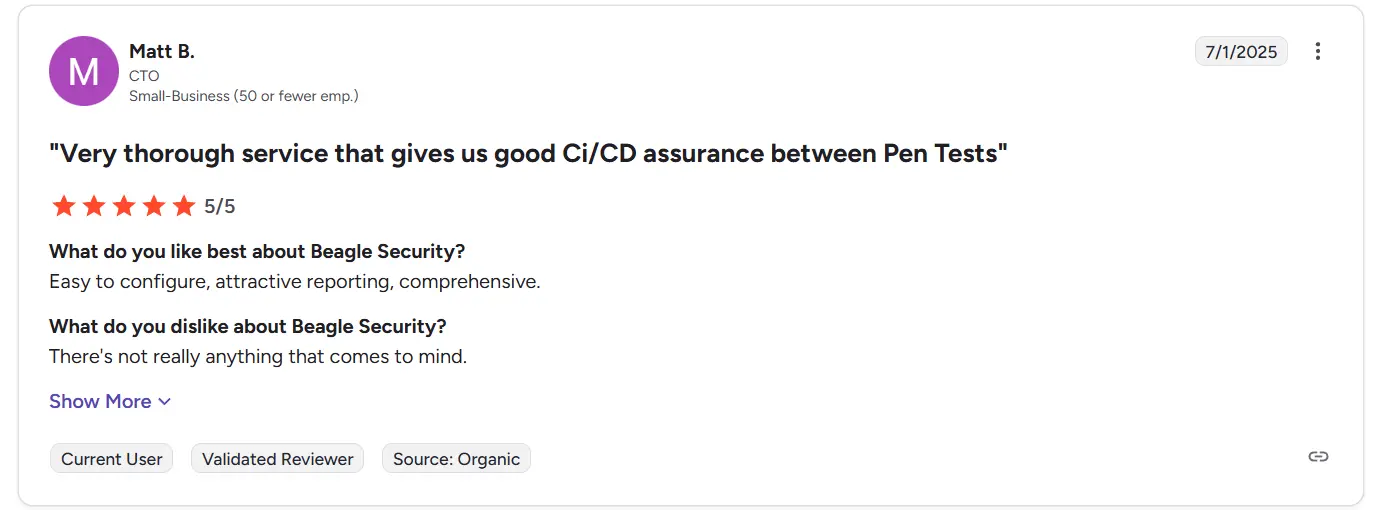
2. Invicti
Invicti (formerly Netsparker) is a well-established player in the DAST space. Known for its accuracy and scalability, Invicti provides automated API security scanning with strong CI/CD integrations and reporting capabilities. It’s favored by security teams in mid-sized to large enterprises who need scalable testing solutions embedded into their SDLC.
Key features:
DAST-based API security testing
CI/CD integrations
Asset discovery
Pricing: Enterprise pricing on request
Ratings & reviews:
G2 rating 4.6/5 (60 reviews)
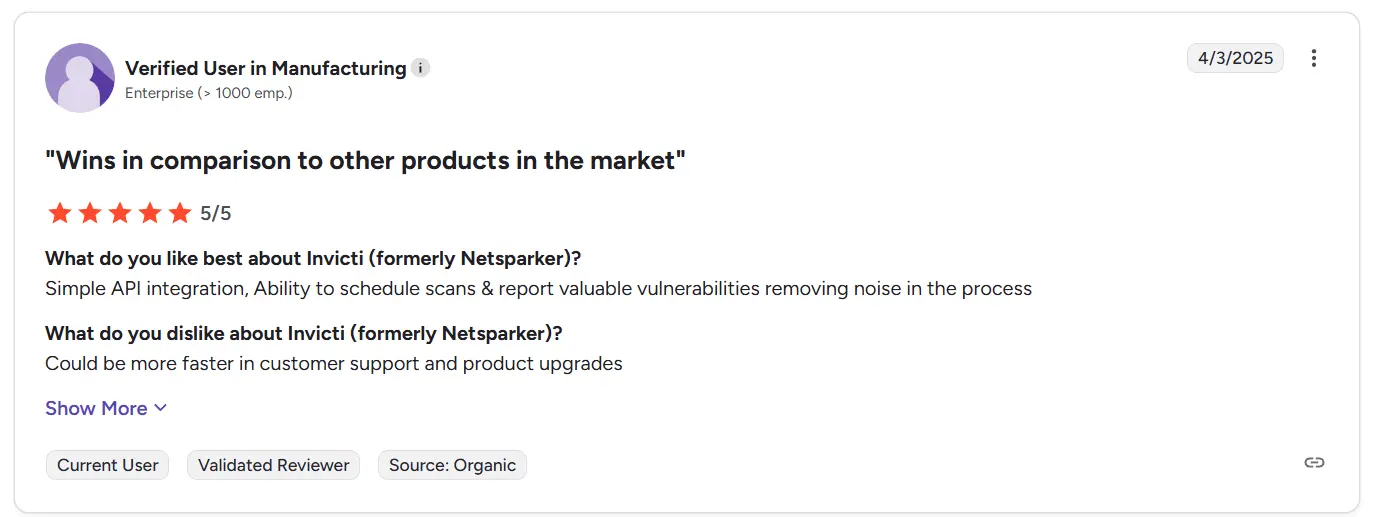
3. ZAP (Checkmarx)
ZAP (Zed Attack Proxy) is one of the most popular open-source security testing tools, maintained by Checkmarx. It supports API security testing through automated and manual methods and is widely used by individual security researchers, startups, and budget-conscious teams looking to strengthen their API security without a large upfront investment.
Key features:
Manual and automated scanning
Open-source
Supports OpenAPI and GraphQL API
Pricing: Free
Ratings & reviews:
G2 rating 4.7/5 (12 reviews)
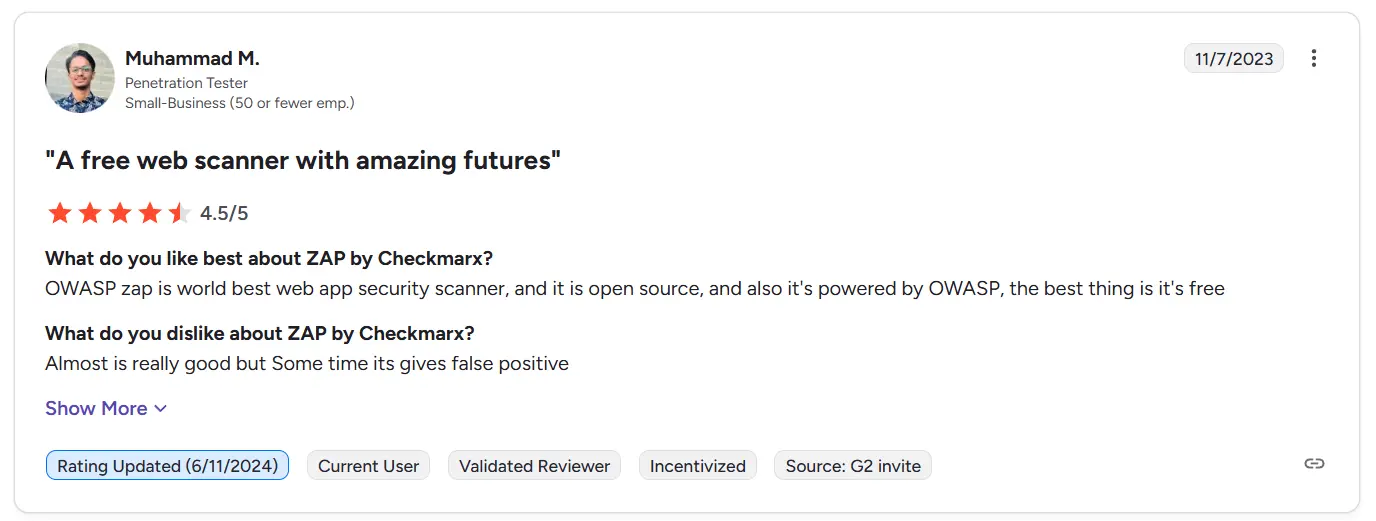
4. Traceable
Traceable offers deep API observability, runtime protection, and threat analytics designed for modern cloud-native environments. Its machine learning-powered detection system helps detect sophisticated API attacks in real time. It is especially useful for organizations that need advanced behavioral analytics and real-time visibility across large, distributed microservices architectures.
Key features:
Real-time API monitoring
Threat detection
Deep insights with trace data
Pricing: Custom enterprise pricing
Ratings & reviews:
G2 rating: 4.7/5 (23 reviews)
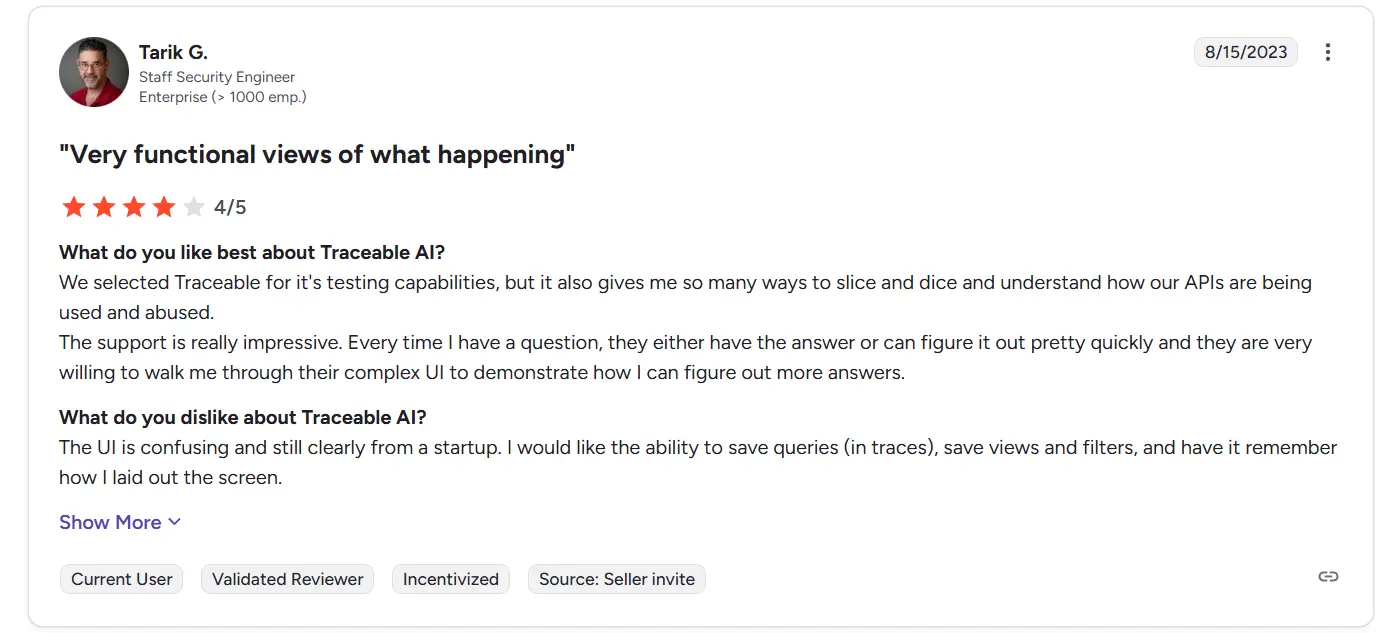
5. Salt Security
Salt Security is focused on API threat detection and runtime protection. The platform automatically discovers APIs and applies behavior-based analysis to detect and prevent API abuse and misuse. It’s particularly well-suited for regulated industries like fintech and healthtech, where compliance and data privacy are top priorities.
Key features:
API posture management
Runtime protection
Threat intelligence
Pricing: Custom pricing
Ratings & reviews:
G2 rating 4.7/5 (12 reviews)
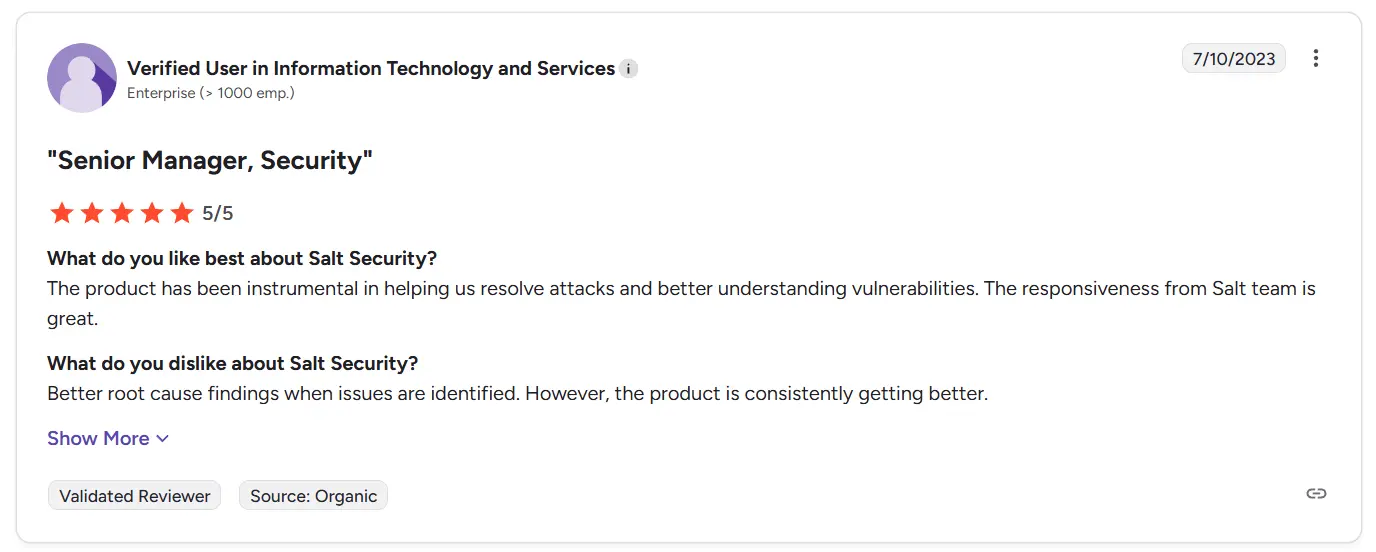
6. Levo
Levo brings modern, developer-first security testing into the build process with its smart fuzzing and automated test generation capabilities. The platform integrates directly into CI/CD workflows and source control, making it ideal for teams who want to shift left and build API testing directly into their development cycle.
Key features:
API inventory
Change monitoring
CI/CD integration
Pricing: Freemium model
Ratings & reviews:
G2 rating 4.9/5 (5 reviews)
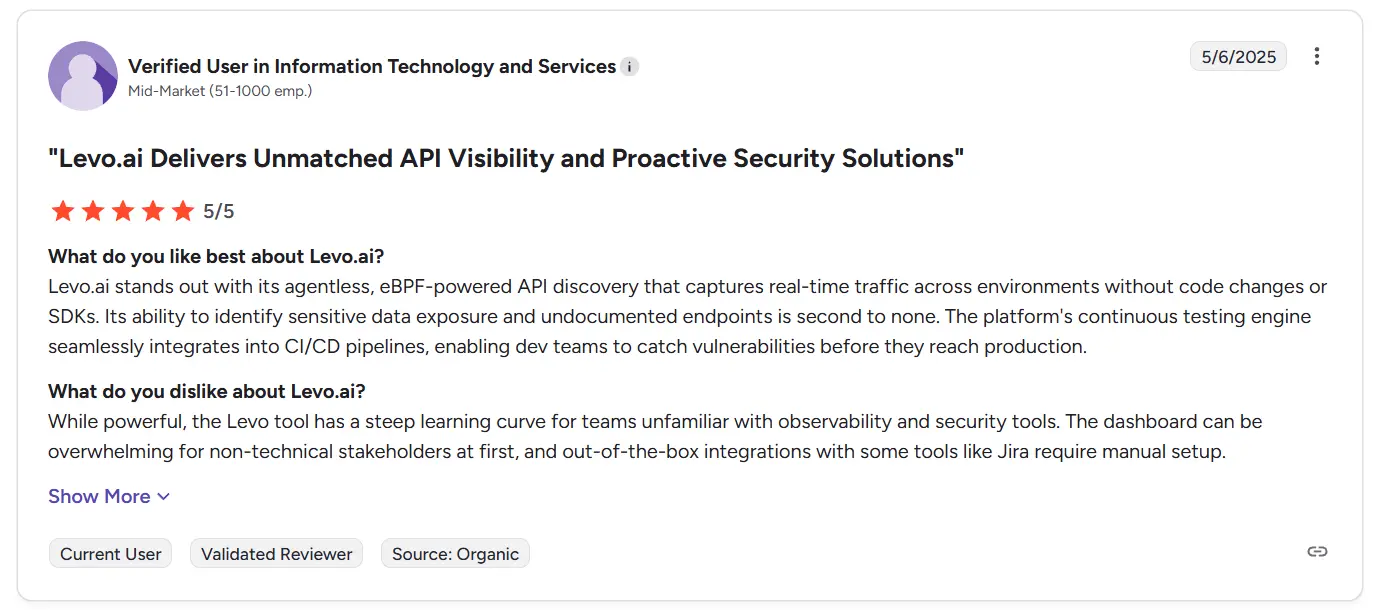
7. Wallarm
Wallarm combines API security with broader application protection capabilities, offering a hybrid WAF and API gateway-based security solution. It provides real-time threat detection and protection with anomaly-based detection and bot mitigation features. Wallarm is a strong fit for companies operating across hybrid or multi-cloud infrastructures.
Key features:
API gateway-based protection
Hybrid WAF
Behavioral detection
Pricing: Custom enterprise pricing
Ratings & reviews:
G2 rating 4.7/5 (95 reviews)
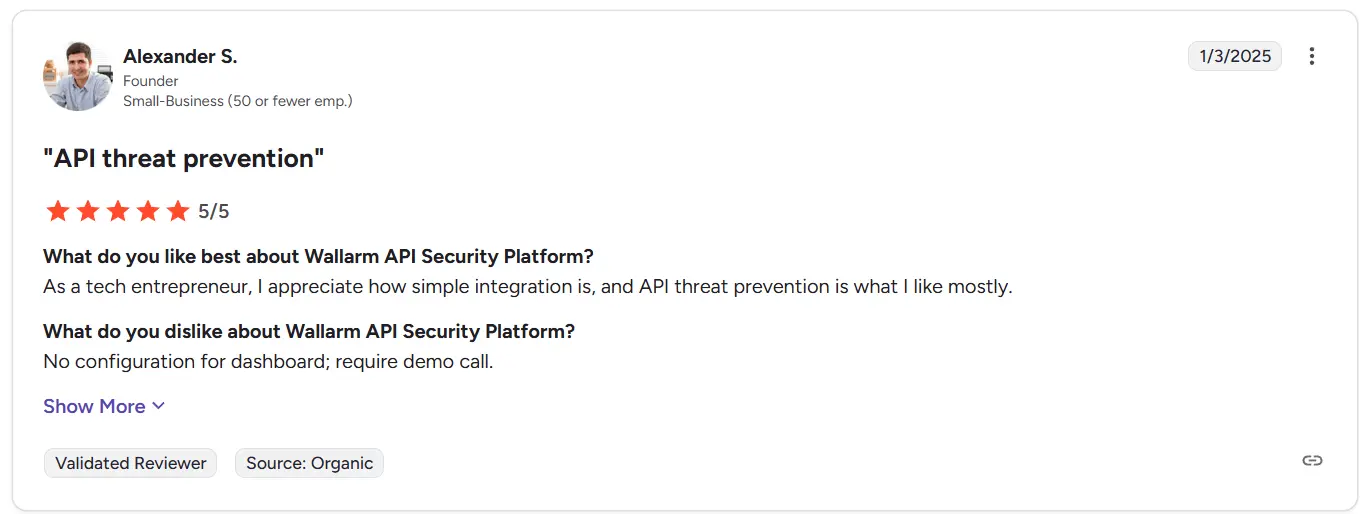
8. Pynt
Pynt is a lightweight, developer-centric API security tool that integrates directly into your existing development workflows. With support for testing as code and seamless GitHub Actions integration, it’s an excellent tool for developer teams who want to make security part of every pull request without relying on external security teams.
Key features:
API testing as code
GitHub Action integration
REST/GraphQL support
Pricing: Freemium with team plans
Ratings & reviews:
G2 rating 4.8/5 (35 reviews)
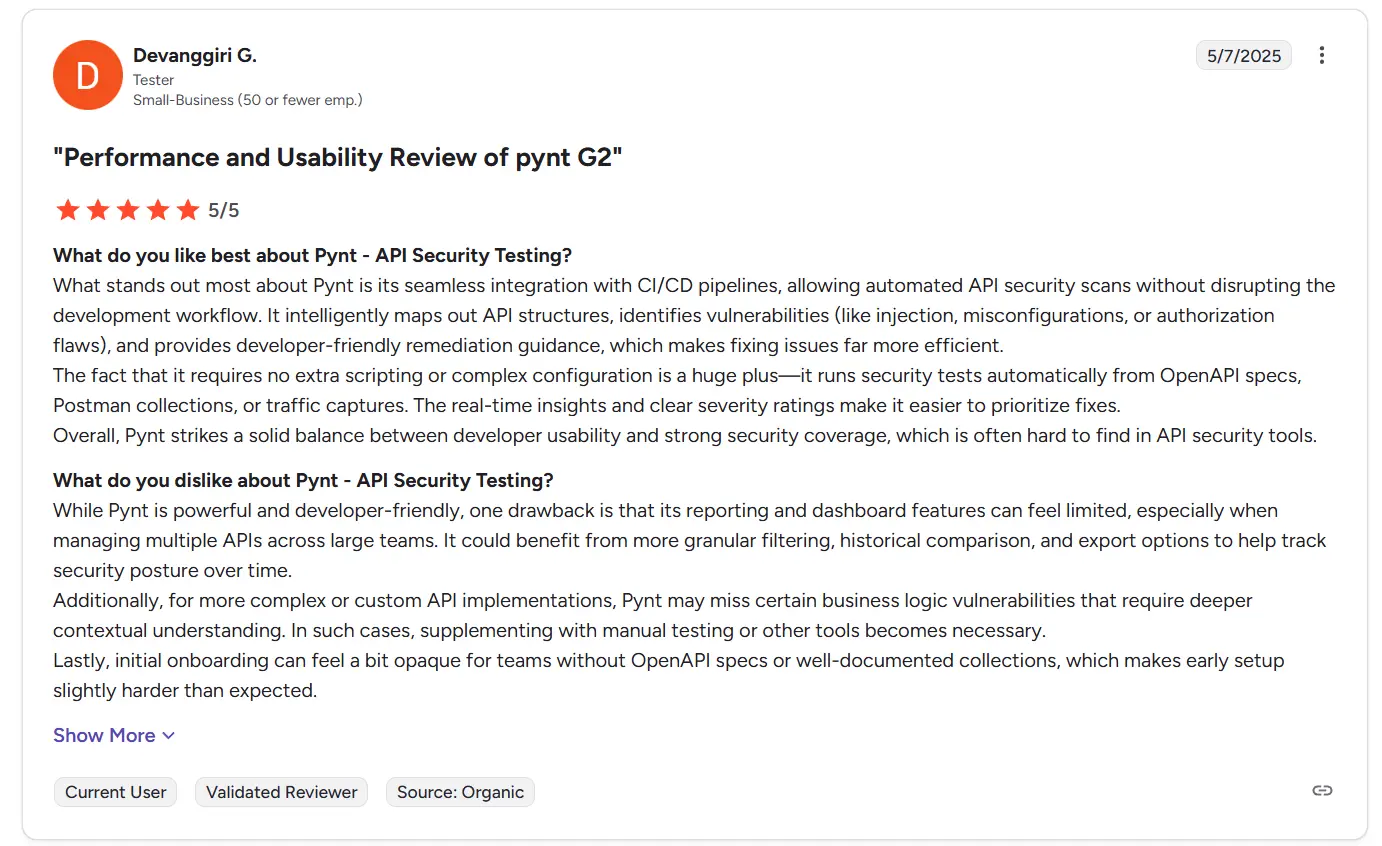
9. APIsec
APIsec is tailored for continuous and scalable API security assessments. It uses OpenAPI specifications to auto-generate tests that mimic real-world attack scenarios and integrates easily into CI/CD environments. It’s ideal for pre-production and staging environments, ensuring vulnerabilities are caught before reaching production.
Key features:
Continuous API scanning
OpenAPI spec-based tests
pre-production focus
Pricing: Custom pricing
Ratings & reviews:
G2 rating 4.7/5 (218 reviews)
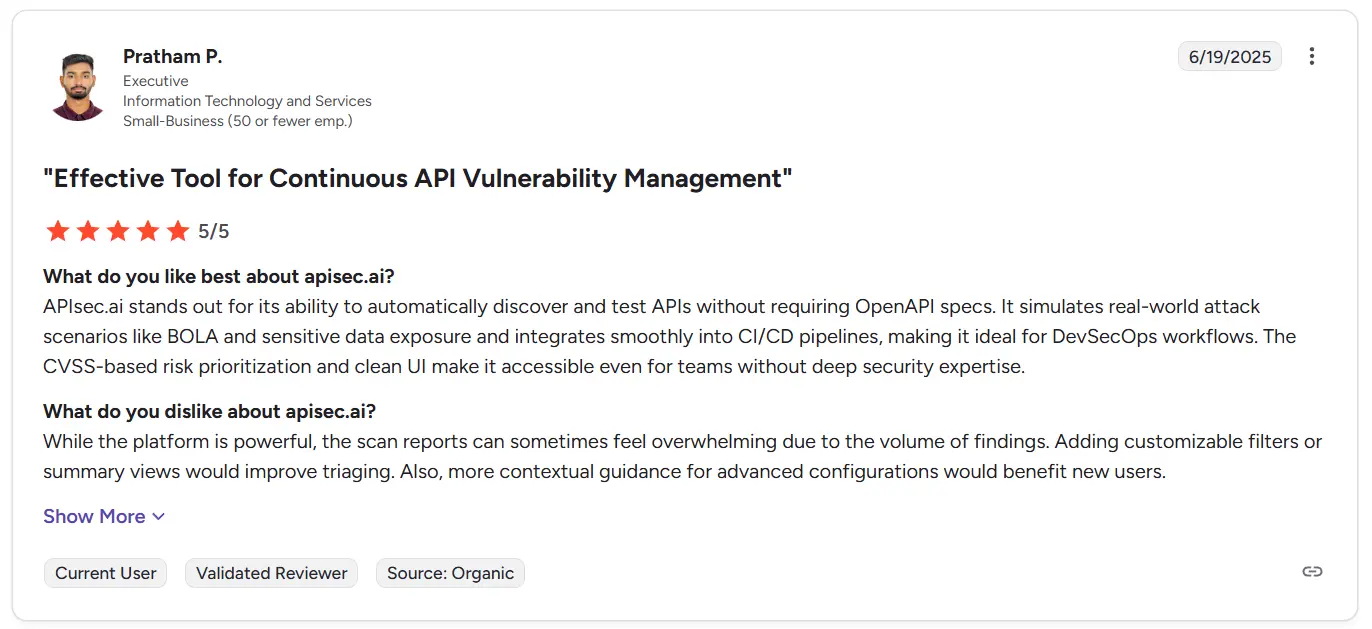
10. Escape
Escape is a developer-friendly platform focused specifically on GraphQL API security. It provides a CLI-based testing tool that fits naturally into local development workflows, enabling teams to identify and fix GraphQL-specific vulnerabilities early. It’s a great option for teams working heavily with GraphQL APIs and looking for targeted protection.
Key features:
GraphQL-specific testing
CLI tool
Integrates with local dev environments
Pricing: Freemium
Ratings & reviews:
G2 rating 5/5 (8 reviews)
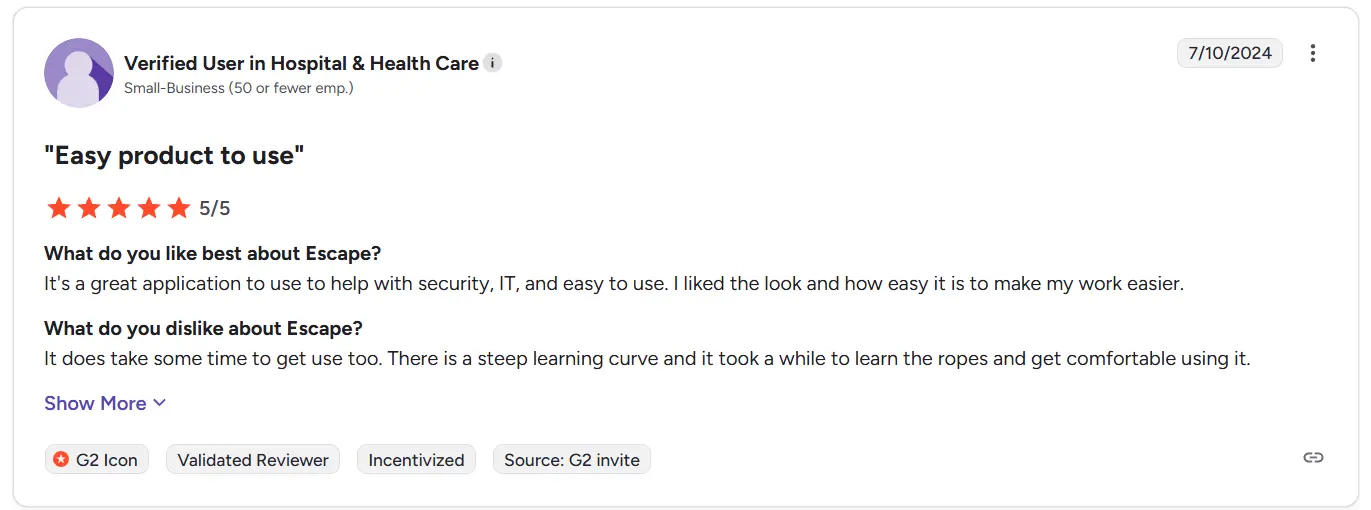
Final thoughts
APIs drive everything. From mobile applications and web dashboards to partner integrations and internal tools.
But with this comes the fact that APIs make a sweet target for attackers. Protecting your APIs is about safeguarding your product, your consumers, and your brand.
Beagle Security was designed with this vision in mind. Its AI-driven platform is specifically tailored for high-growth SaaS and API-first businesses that want to go fast without sacrificing security.
With automated API discovery, contextual penetration testing, and rich CI/CD integrations, Beagle Security makes it possible to stay ahead of threats while keeping developers informed.
Whether you’re beginning your API security journey or expanding your existihttps://calendly.com/abeykoshyitty/beagle-security-enterprise-demo?month=2025-07ng efforts, Beagle Security provides the ease, flexibility, and depth you require to integrate security into your workflow and culture.
Want to learn more about the larger API security ecosystem? Visit the OWASP-curated list of API security tools to find a vast array of open-source and commercial solutions that can enrich your security stack.
Ready to protect your APIs with confidence?
Begin your 14-day free trial or schedule a demo today and embark on the journey to smarter, scalable API security.



![Acunetix vs Nessus: Which is right for you? [2026] Acunetix vs Nessus: Which is right for you? [2026]](/blog/images/acunetix-vs-nessus-which-is-right-for-you-2026-cover.webp)
![OpenVAS vs Nessus: Which is the best choice for you? [2025] OpenVAS vs Nessus: Which is the best choice for you? [2025]](/blog/images/openvas-vs-nessus-which-is-the-best-choice-for-you-2025-cover.webp)


![Top enterprise application security tools [2026] Top enterprise application security tools [2026]](/blog/images/blog-banner-four-cover.webp)
![Top vendor application security testing tools [2026] Top vendor application security testing tools [2026]](/blog/images/blog-banner-six-cover.webp)
![Best API security tool for developers [2026] Best API security tool for developers [2026]](/blog/images/blog-banner-five-cover.webp)

![Top Bright Security alternatives [2026] Top Bright Security alternatives [2026]](/blog/images/blog-banner-one-cover.webp)